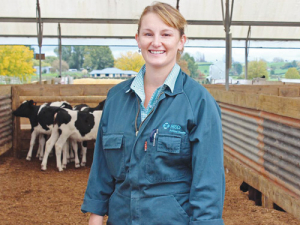Recycling 10,000 cow collars
MSD Animal Health New Zealand has partnered with Agrecovery in New Zealand’s first pilot to recycle SenseHub Dairy Collars (previously known as Allflex Collars) used by its dairy farmer clients.
 Vet Jo Houlter says money spent up front on a quality triple combination drench can save money later in terms of animal production.
Vet Jo Houlter says money spent up front on a quality triple combination drench can save money later in terms of animal production.
Farmers can no longer simply buy the cheapest drench, assume it is doing a good job of killing worms and not consider the longer term implications, says Jo Houlter, veterinary technical advisor, MSD Animal Health.
“Today, preventing and managing drench resistance and worm control must be a consideration in every animal health decision a farmer makes,” Houlter says. “Drench resistant worms are common and widespread in sheep and cattle in New Zealand and need to be actively managed.”
She says there are three main strategies for managing drench resistance on NZ farms:
- Minimising high-risk drenching and management practices
- Maintaining worm populations not exposed to drenching by the use of refugia
- Using combination drenches.
Combination drenches contain a mixture of different drench actives and worms resistant to one active ingredient will generally be killed by another.
“Field studies and modelling have shown the potential of combinations to slow the development of resistance,” Houlter say. “These studies all show that combinations have the greatest potential to slow drench resistance when they are used before resistance has developed in the farm worm population.”
She says that, by far, the best time to use combination drenches is when the actives are still effective on their own before worms have developed significant resistance.
“Saving the combination drenches until you need them is not the correct approach.”
She says triple active drenches are better than double actives, but are also more expensive. “This extra expense provides insurance against the possible future development of resistance and means that you are doing the best thing for your sheep, cattle and farm.”
Houlter says Alliance is a triple combination drench that includes levamisole, abamectin and oxfendazole, some of the best actives to control worms in sheep and cattle on NZ farms.
“Will a lesser, cheaper drench do the same job?” she asks. “Maybe but possibly not and you won’t know unless drench testing is carried out.”
Houlter says money spent up front on a quality triple combination drench can save money later in terms of animal production and the possible need to use even more expensive drenches or more drastic measures when drench resistance has developed on your property.
Alliance has been developed, proven and made in NZ for NZ livestock.
The National Wild Goat Hunting Competition has removed 33,418 wild goats over the past three years.
New Zealand needs a new healthcare model to address rising rates of obesity in rural communities, with the current system leaving many patients unable to access effective treatment or long-term support, warn GPs.
Southland farmers are being urged to put safety first, following a spike in tip offs about risky handling of wind-damaged trees
Third-generation Ashburton dairy farmers TJ and Mark Stewart are no strangers to adapting and evolving.
When American retail giant Cosco came to audit Open Country Dairy’s new butter plant at the Waharoa site and give the green light to supply their American stores, they allowed themselves a week for the exercise.
Fonterra chair Peter McBride says the divestment of Mainland Group is their last significant asset sale and signals the end of structural changes.

OPINION: Your old mate welcomes the proposed changes to local government but notes it drew responses that ranged from the reasonable…
OPINION: A press release from the oxygen thieves running the hot air symposium on climate change, known as COP30, grabbed your…